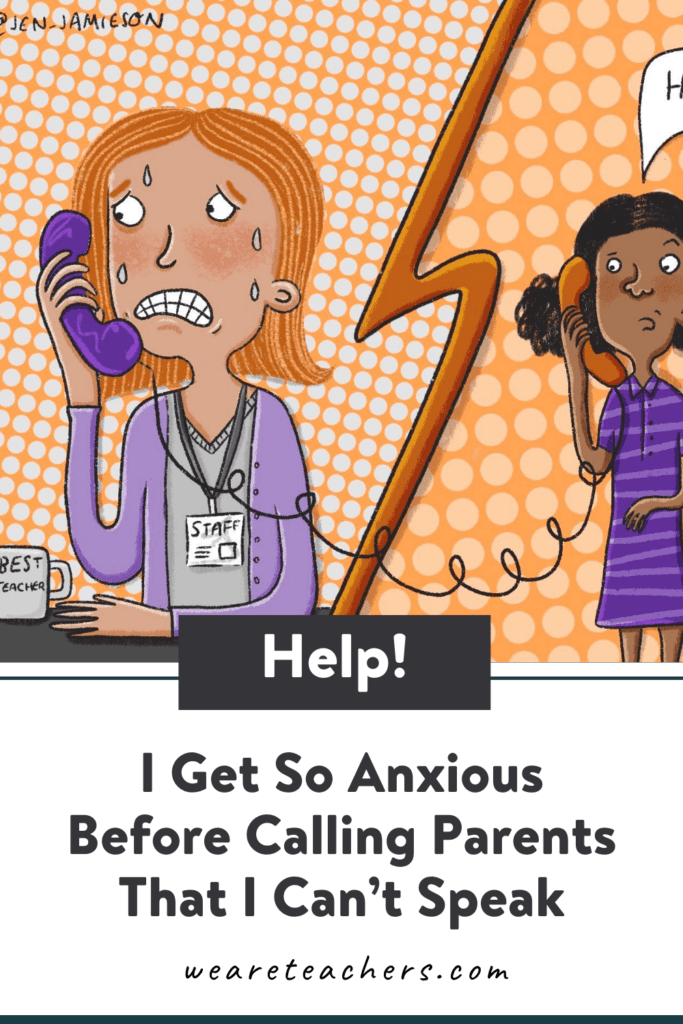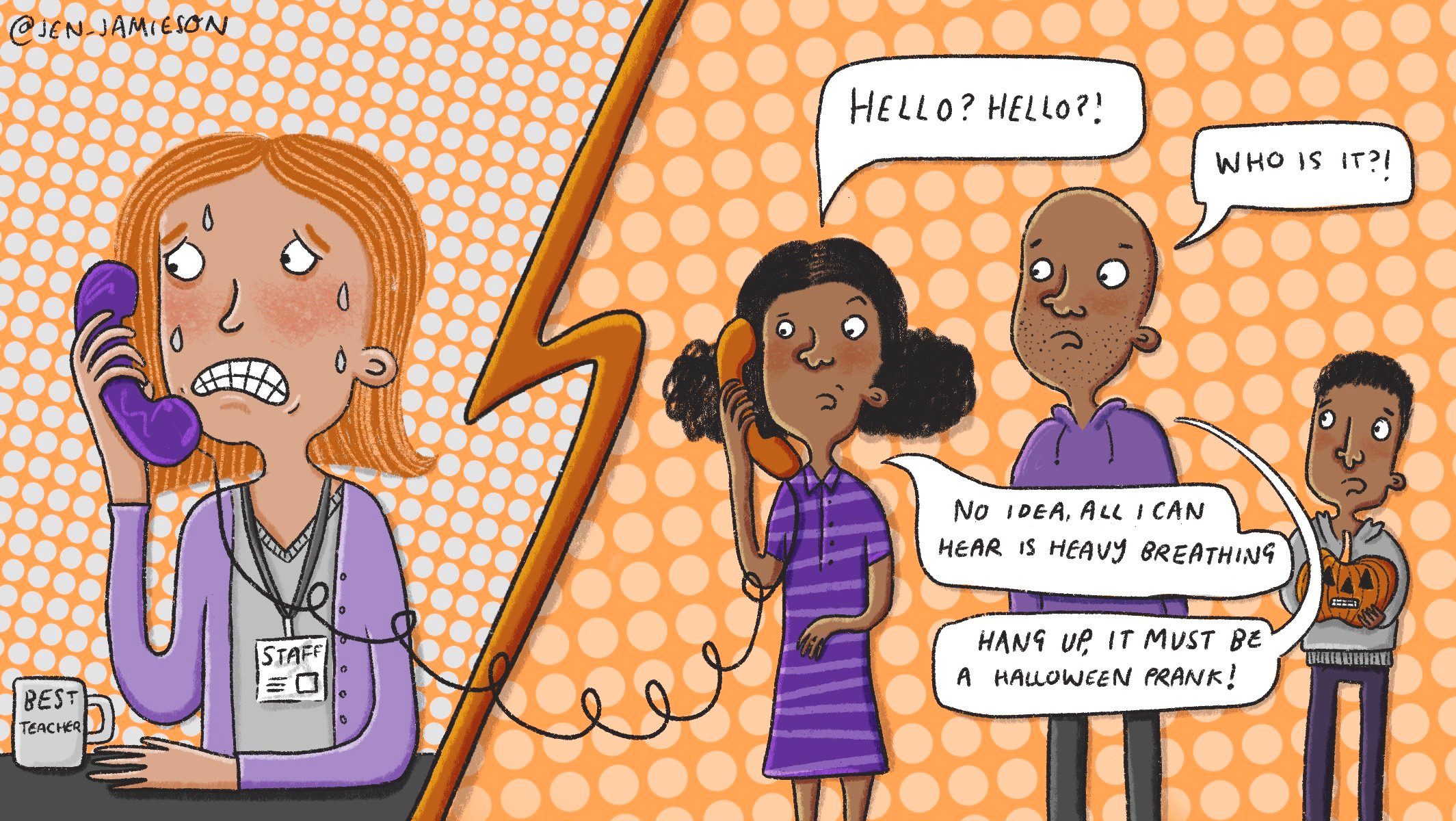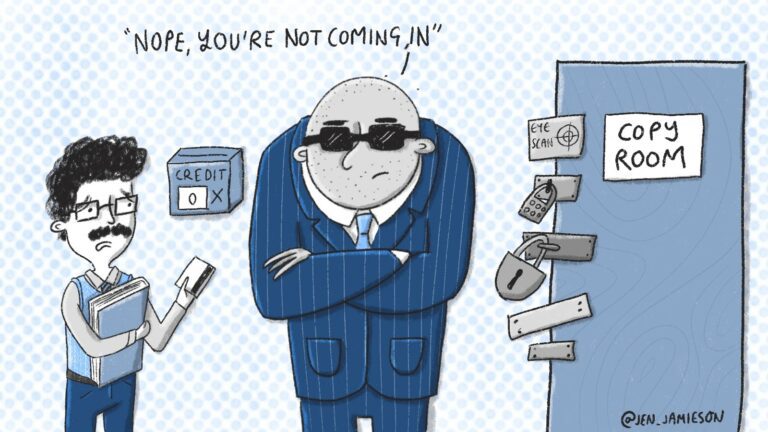DearWeAreTeachers:
I’ve been teaching for about three years now, and although I really enjoy working with the kids, there’s one part of this job I dread: calling parents. I have trouble with phone calls in general, but calling students’ parents is the worst for me. Often, I pray they don’t pick up, and when they do, my chest tightens up and it’s hard to talk. How can I handle the anxiety of calling parents? —Please Don’t Answer
Dear P.D.A.,
If we surveyed teachers, I’m confident that the vast majority of them would say there is something they dread about their work. Many teachers, just like you, experience social anxiety, which can take the form of fear and avoidance of making phone calls. Telephobia is an actual thing. Phone calls require focus and pressure to respond right away. And the lack of context with gestures, eye contact, and facial expressions can increase those uneasy feelings.
I’m sure you have heard the saying “The only thing to fear is fear itself.” And there are a plethora of supports and techniques to help you process and work through your fears and anxieties. Fear is the emotion we feel when we see a threat. Anxiety is when the fear response overreacts.
Thank you for bringing up a very real issue that so many of us face. You are not alone, that’s for sure. A UK survey found that 76% of millennials have anxious thoughts when their phone rings, while about 40% of baby boomers feel the same way. The survey findings show that 61% of millennials and 42% of baby boomers completely avoid calls.
Often when people experience anxiety related to using the phone, they feel emotional and physical responses in their bodies. You describe a tightness in your chest. Some people experience shallow breathing and a racing heart and obsess about what to say. Notice how your body feels and gently remind yourself that you are driving and fear can take a backseat, or better yet, the trunk.
You have many options to help you navigate the constricted feelings you experience when you need to call a parent. In addition to setting up brief face-to-face meetings, consider finding out if parents are open to texting versus calling. The nature of texting allows for pausing and intentional language, which can decrease feelings of anxiety. Maybe a Zoom call would feel better with the opportunities to connect with non-verbal communication.
Author Elizabeth Gilbert says it best: “Fear and I are very, very old friends. We’ve been walking together side by side for pretty much my entire life. We’ve actually never spent very much time apart, and so you could say that I have come to know fear pretty well, learned to work with it, learned to be intimate with it.” Often we tell others and ourselves “Don’t be scared.” Elizabeth Gilbert, on the other hand, encourages us to face fear with a compassionate heart. Her writing and meditation have helped me have a healthier relationship with my fears. It’s my hope her positive ripple effect will reach you, too.
Dear WeAreTeachers:
What do you do/say when a Black student uses the N-word in class? I was a bit taken aback since obviously it can be considered racist. I just told him that I didn’t like hearing that word in my class. But should I have handled it differently? I’m white and most of my students are Mexican, if that matters. —Way Out of My Comfort Zone
Dear W.O.O.M.C.Z.,
Before we jump into ideas, please know I personally have a vast array of teaching experiences in diverse systems. I’m drawing on my compass to be a culturally responsive teacher, social justice activist, and part of transforming education in a diverse society to benefit all students. And I also want to acknowledge that I am a privileged white woman who is highlighting other voices to build our capacity to gracefully and strategically approach conversations about the N-word.
I spoke to author and Director of Professional Development Dr. Towanda Harris, who advised, “You definitely want to refrain from allowing the word to be used in class, but it would help to address it. You may want to begin with a discussion of the history of the N-word and how it evokes different emotions from different individuals, regardless of race. I would also discuss the importance of context in which the word is used and how it can be used as a weapon to demean, oppress, or reinforce stereotypes.”
Students want to engage in meaningful, relevant topics, and racism affects every single one of us. Having clear expectations and norms for the N-word conversation will be of utmost importance. Some norms to include might be to assume good intentions, seek understanding, no interruptions, and everyone’s ideas matter. Collaboratively define what respect looks, sounds, and feels like. Once you have calm, respectful energy in your classroom space, bring up the topic of the N-word. Explain that the overall purpose is to learn from one another, deepen understanding, and ensure inclusivity.
Learning for Justice has a wealth of resources to build educator capacity to handle tough conversations like this one. Straight talk about the N-word is doable and important. It’s complex, as Sean Price describes: “The N-word is unique in the English language. On one hand, it is the ultimate insult—a word that has tormented generations of African Americans. Yet over time, it has become a popular term of endearment by the descendants of the very people who once had to endure it. Among many young people today—Black and white—the N-word can mean friend.”
As educators, we create learning conditions in our classrooms. Facilitating contemplation on racism in schools and our society at large can feel supercharged and uncomfortable. And yet, we need to lean into this discomfort to help create more just spaces for every single human that crosses our paths and is under our wings in the classroom and beyond.
Thank you for doing your research and having the courage to facilitate ongoing conversations about racism and the history of and multiple meanings of the N-word. It will take some groundwork, and it’s absolutely worth it. Talking about racism is not just good for “them,” it’s good for the collective “us.”
Dear WeAreTeachers:
I have a paraprofessional who taught most of her adult life in my room and has verbally yelled at my class to stop talking because she “gets a headache.” A concerned parent emailed me seven paragraphs about how my para belittled her son. She physically moved this student’s head to look at the board during moments of my teaching. She even grabbed his mask on his chin and pulled it up. My para also interrupts my lessons to “help” the students. I talked with my principal, who helped me respond to the parent and told me then to talk with my para. I was also advised to start keeping a record of these moments. How do I advocate for my students and also deal with the adult stuff? —Para Problems
Dear P.P.,
While it’s true that every once in a while educators lose their cool, this situation with your para-educator sounds extreme and is negatively impacting you and your students. Nurturing a positive classroom culture is hard enough and there are countless distractions that make learning challenging. However, having a fellow educator yelling and inappropriately touching students is just plain wrong. Follow your gut on advocating for your students.
I can sense your frustration, and you did the right thing by pulling in your administrator. What you describe is not professional and it’s an abuse of power. Learning for Justice provides language to describe teacher bullying, which is what it sounds like is happening. They describe teacher bullying as “a pattern of conduct, rooted in a power differential, that threatens, harms, humiliates, induces fear in or causes students substantial emotional stress.” Adults need to be held accountable for these destructive behaviors.
Yes, documenting what’s happening helps substantiate any administrative actions and is important. I have to say that as a parent, I would not be OK with an educator belittling my daughters, turning my child’s head, pulling up their mask, or yelling. Even though you are following your principal’s protocol to document what’s going on, this doesn’t sit well with me. Have you considered going back to your principal and saying you don’t feel comfortable being the one to talk to your para-educator? This is the role of the administrator and is not your sole responsibility.
I’ve been in settings at school where teachers are just fed up and feeling out of control and they raise their voices and yell. The thing is, yelling doesn’t create authentic behavior change. Instead, yelling erodes trust, creates anxious energy, and is just plain awful modeling for our impressionable students.
When you get the urge to yell, try doing the opposite and start speaking more quietly like a whisper. This voice modulation is often more effective in getting the students’ attention than yelling and doesn’t have negative, distressing energy. Be strong for your students. They need you to be the adult who interrupts the para-educator’s toxic patterns. It may sound harsh to say, but this individual needs to find another line of work. Our students deserve hope, not despair. Emily Dickinson wrote, “Hope is the thing with feathers that perches in the soul.”
Dear WeAreTeachers:
Our district is experiencing a major substitute teacher shortage. I had to cover Thursday, Friday, Monday, and Tuesday, and will lose my prep to cover again tomorrow. I just can’t continue to do this anymore. What disciplinary actions might my administration take if I just start saying no when asked to cover? I’m so stressed out and frustrated. —Just Say No
Dear J.S.N.,
During a normal school year, teachers are pulled in a million directions and are just spread too thin. Add a global pandemic, COVID-19 protocols, planning for independent learning during quarantine, and the teacher shortage, and the frayed rope just doesn’t hold anymore. Being asked to cover classes over and over again like you are experiencing is a major drain. You have been stepping up and putting students first and have become accustomed to compromising and sacrificing contract agreements as well as your well-being.
The pandemic has exacerbated feelings of being strained and overwhelmed. There is an increase in teacher retirements and resignations, and the lack of substitute teachers has caused schools to have to scramble on a daily basis. Ask any school principal about the first couple hours of their morning. They are in problem-solving mode with creatively organizing classroom coverage. It has become commonplace for classes to gather in the cafeteria and be monitored by one staff member, often the principal.
Many districts are increasing their substitute-teaching rates in the hopes of maintaining continuity, but it’s just not making the impact that they’ve been hoping for. Recently, when I was at a site, teachers confided in me how discouraged they felt by leadership asking them not to use personal days because of the impact on the site.
So how might you move forward in this current context? One idea is to just say no. However, in many states, teachers’ contract language includes “duties as assigned.” A firm “no” might be viewed as insubordination and lack of being a team player. Reach out to your union representative to review your rights and learn what is considered to be misconduct by your state commission on teacher credentialing. The language differs from state to state.
Additionally, make your needs known to your union representative and administration and rally for compensation for these extra duties. Even though I know you truly desire your prep time, it’s possible you and your fellow educators could request extra money because of the large class sizes and ongoing classroom coverage. Consider saying something like this to your principal: “Since I’m subbing in classrooms every day, how would you like me to turn in my hours?” It doesn’t solve the problem, but it can make you feel more valued.
Do you have a burning question? Email us at askweareteachers@weareteachers.com.
Dear WeAreTeachers:
My department coordinator is observing me next week. She sent me so many questions to respond to, and they are due along with my lesson plan with a very short turnaround. How does this further student learning? How does stressing out teachers help my students? I seriously want an answer to that. It just seems like busy work and a further narrowing of the curriculum. It’s so nerve-wracking, and even though I explain what’s going on with the students beforehand, things always seem to be bumpy. I’m dreading this. What tips do you have to help me endure this torture?
Illustration: Jennifer Jamieson


